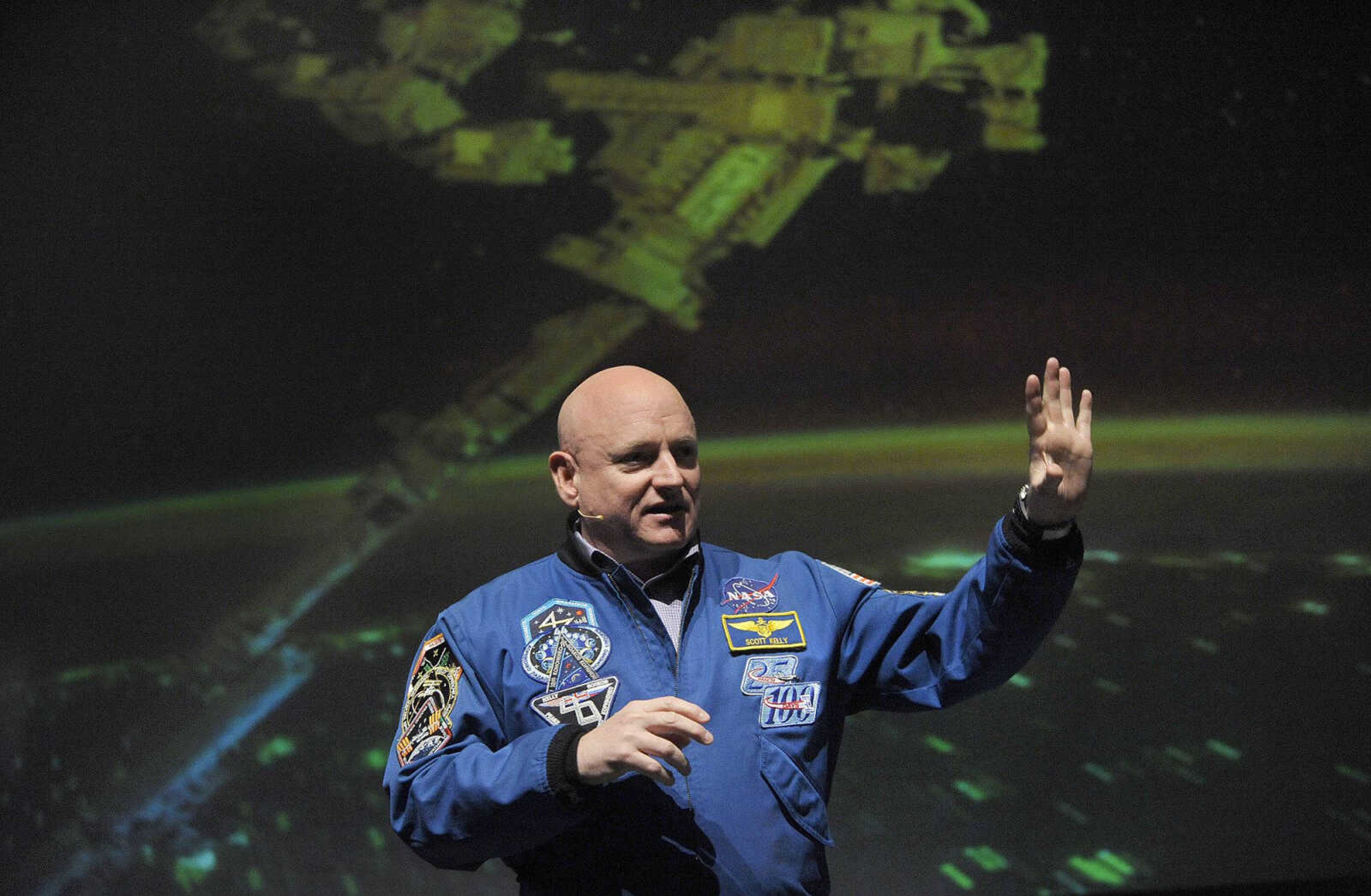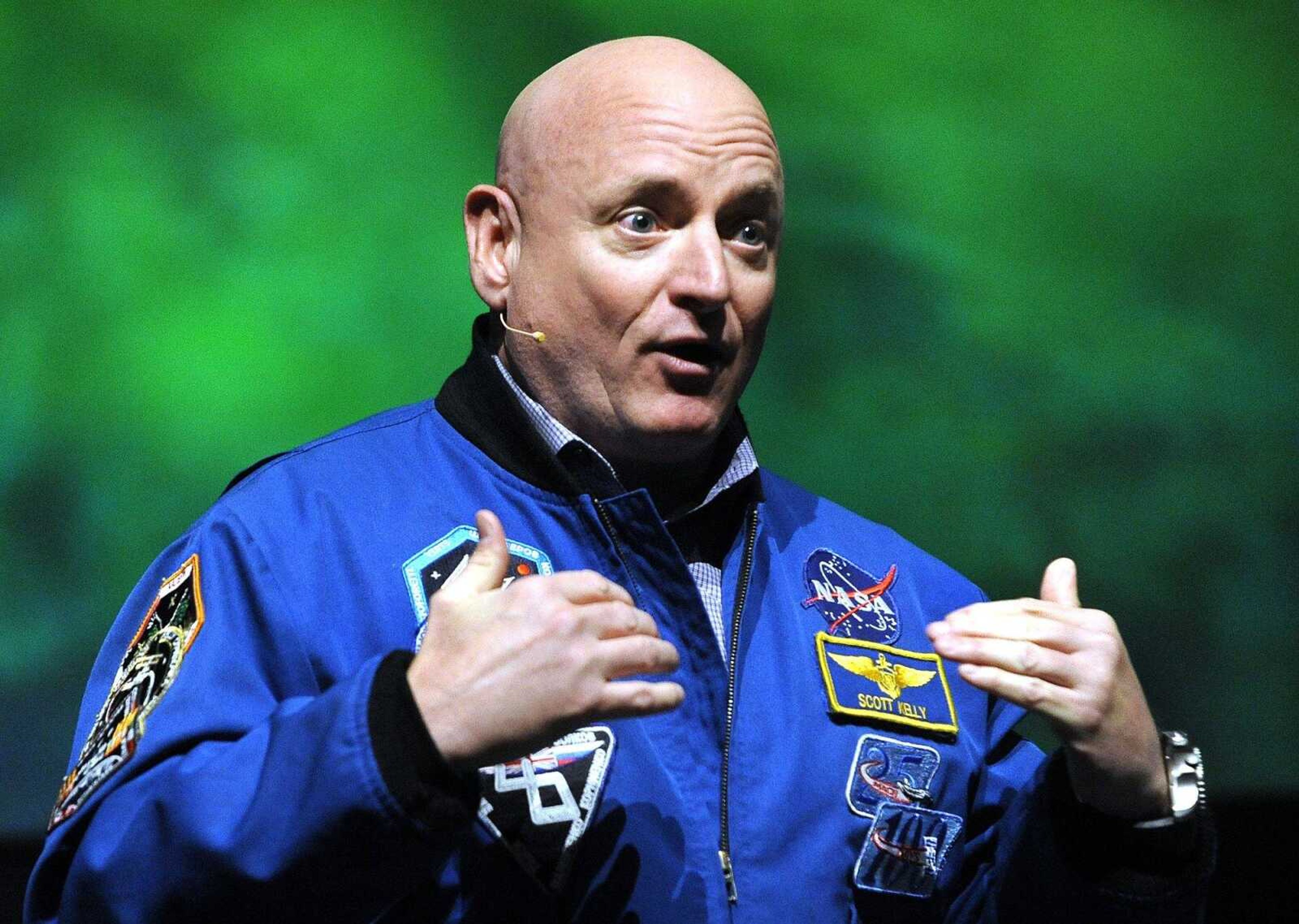Astronaut Scott Kelly's message Wednesday night at the Show Me Center built upon the idea impossible things are worth striving for.
He told the audience when he was a child, it was impossible for him to become an astronaut.
He recalled the time when, during a bathroom break in first grade, he was asked by a classmate what he wanted to do when he grew up.
Probably play for the Mets, he said.
When the other student said he wanted to be an astronaut, Kelly changed his mind and joined him.
But it was more than a long shot.
"When I was a kid growing up, I was a really crappy student," he said.
He graduated in the bottom half of his high-school class and went to the wrong college.
He applied, was accepted to and showed up for classes at a different school than he'd intended.
And even then, he shirked his studies, skipped class and couldn't pay attention.
On a lark, he bought Tom Wolfe's "The Right Stuff," the story of test pilots and astronauts from the Gemini, Mercury and Apollo missions.

He decided he, too, had the right stuff to become a test pilot, but the prospect of righting his lackluster academic streak was daunting.
He remembered his mother, who one day had decided to join the police force in New Jersey where her husband, Kelly's father, was a detective.
She was physically slight, and to get the job, she had to complete the same obstacle course as her male peers, which included scaling a 7-foot, 3-inch wall.
Kelly said his father built her a 7-foot, 4-inch one to practice on in the backyard, and by the end of the summer, she could do it.
Kelly said she was the one who taught him a giant leap is just a bunch of small steps -- a convenient principle for the aspiring astronaut.
He studied harder, graduated and got into flight school.
There, he realized he was a lousy pilot, and his goals were quite possibly, if not probably, out of reach.
He studied harder anyway, graduated flight school and became a successful F-14 Tomcat pilot.
Making mistakes and failing, he said, is extremely important, as it helps build the grit necessary for one to find out what he or she is truly capable of.
He applied for the space program and got in, along with his identical twin brother, Mark.
After what otherwise would have been a successful astronautical career, NASA decided to send him to space for a year, basically just to see what would happen.
If humans are to advance past low-earth orbit, he explained, we have to troubleshoot the human physiology in a zero-gravity environment.
For example, the body in space loses 1 percent of bone mass per month if preventive measures aren't taken.
And space is scary even when everything's going fine, as he found out one day when NASA told the International Space Station a satellite was on a course possibly to strike them.
It was serious. It was too late to move the ISS, and the satellite was speeding at 20 times faster than a bullet.
Kelly recalled the conversation among himself and his two Russian colleagues while crammed into the lifeboat rocket, waiting for impact or lack thereof.
"It will really suck if this satellite hits us," one Russian said.
"Da," the other agreed. "It will suck."
While Kelly had spent the two preceeding hours initiating disaster protocol and sealing every hatch on the American side, the Russians had considered the odds, duly recognized the gravity and decided to lunch instead of worry.
The way they saw it, the satellite would either annihilate them or pass harmlessly by the wayside.
The satellite missed them.
While Kelly praised his Russian colleagues effusively, he said he's always believed in "doing the hard thing," even if that thing isn't all that likely to come to fruition.
That's the attitude that landed him in space in the first place, he said. And it's what made the whole experience so satisfying.
"The best part about [space] for me," he said, "is that it's hard."
tgraef@semissourian.com
(573) 388-3627
Connect with the Southeast Missourian Newsroom:
For corrections to this story or other insights for the editor, click here. To submit a letter to the editor, click here. To learn about the Southeast Missourian’s AI Policy, click here.







